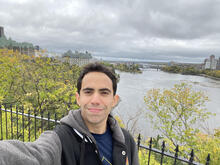Why did you choose to pursue graduate studies at the University of Waterloo?
Because the Department of Actuarial Science at the University of Waterloo is the largest and most prestigious in the world. Whichever topic you may be interested in, there is always one faculty member researching that topic. It is great to be here. Additionally, when I was accepted, I was thrilled that Mary Hardy, the most recognized woman in actuarial science, and Paul Marriott, an incredibly smart statistician specialized in differential geometry (a topic I essentially knew nothing about), wanted to work with me.
 Describe your research and what makes you passionate about it:
Describe your research and what makes you passionate about it:
The main goal of my research is to understand when and how does either direct or indirect discrimination arise in insurance and suggest guidelines that can mitigate its impact on society.
I've always wanted to use my mathematical skills to improve the current state of the world. Discrimination in financial services is not straightforward to detect, even for the people who design and price the products. Not because they do not care or because they attempt to harm people, but because they are not aware.
I believe I have been fortunate to be where I am and be able to understand the probabilistic theory that happens behind the scenes. Therefore, I feel it is my responsibility to help those that suffer the consequences, either because they do not have a choice or because they do not know.
Tell us about where you are from:
I was born in Mexico City, that is where I grew up and obtained my undergrad in Actuarial Science at Universidad Anáhuac. After working for a while there, I came to Montreal to study my MSc in Mathematics at Concordia University. I fell in love with Canada, and it was a natural choice, given my academic formation, to come to the University of Waterloo for my PhD.
What is the best part about being a grad student?
The liberty of being able to attempt to solve problems you are truly interested in.
What activities, groups, events are you involved in?
I love swimming. I go 4 to 5 times a week to the pool at the Physical Activities Complex (PAC) and swim for a full hour.
I started when I arrived at Waterloo and now I just cannot stop. I started by swimming less than a kilometre. Now, I feel so proud that I've greatly improved my butterfly stroke and I'm able to swim more than 2.4 kilometres each time I go to the pool.
How do you spend your free time?
I love exercising. It always clears my mind and makes me feel grounded. I have been a serious runner for the last decade, I've done a marathon and it's a challenge that made me feel great about myself. After that, by improving my swimming here at Waterloo, now my goal is to train for a triathlon.
What advice do you have for new graduate students?
Research what you are most passionate about. Not a hot topic, not something that will make you rich, not something your supervisor is good at. You are going to be stuck for years researching, talking about and practicing whatever topic you decide. If you desire excellent results, you need to feel like it is your topic and gives you a reason to wake up and work every single morning. Plus, even if it's challenging, you'll be happier.
What are some of the challenging aspects of being a graduate student and how do you address these challenges?
I think the main challenge for most people doing graduate studies is the lack of discipline. I see a lot of people in graduate studies struggle to make progress because commonly, there isn't anyone telling you what to do. There is no clear path you have to follow. You have your supervisor, which is an amazing guide, but it is you who is the main one responsible for your research. If you do not use your time wisely, you end up feeling guilty and probably sad, even during the weekends, because you do not make any significant progress.
I've addressed this by writing down all the things I want to achieve during my PhD. Then I break that down into years, that into months, and that into weeks. That way, each week, I know the small things I need to get done in order to achieve a larger, long-term goal. This has also helped me to have all weekends off (as it should be). Naturally, things come up and the plan needs to be re-evaluated continuously. But that is not a big issue, the big issue is not having a path and drifting into oblivion.
Country of origin: Mexico
Domestic or International: International
Academic stream: Research
Full-time or part-time: Full-time
Research supervisor: Mary Hardy and Paul Marriott
Graduate student awards held: Dean of Math Excellence Scholarship (2019) and Statistics and Actuarial Science Chair's Award (2020, 2021, 2022)
TA/RA or GRS held: GRS




